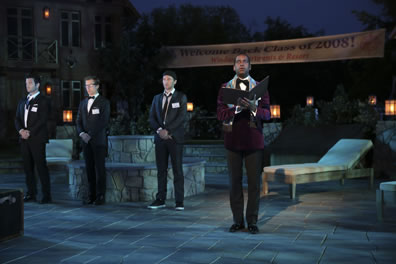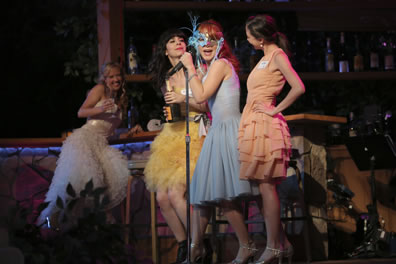Love’s Labour’s Lost
Musical Adaptation Needs a Big Lift
The Public Theater’s Shakespeare in the Park, Delacorte Theater, New York, N.Y
Saturday, August 17, 2013, L–301 & 302 (center left)
Songs by Michael Friedman, Book Adapted and Directed by Alex Timbers

The King of Navarre (Daniel Breaker) reads the academy's decree to, from left, Berowne (Colin Donnell), Dumaine (Lucas Near-Verbrugghe), and Longaville (Bryce Pinkham) in the Shakespeare in the Park musical version of Love's Labour's Lost. Photo by Joan Marcus, The Public Theater.
The pedigree is promising. Michael Friedman and Alex Timbers, the guys who created one of the funniest musicals of the past five years with Bloody Bloody Andrew Jackson, have adapted William Shakespeare's Love's Labour's Lost as a modern musical to play in The Public's exalted Shakespeare in the Park program at Central Park's Delacorte Theater. It's the first time The Public has done a new musical Shakespeare since the Galt MacDermot-John Guare-Mel Shapiro Two Gentlemen of Verona debut in 1971, which went on to win a Tony for best musical, topping Grease and Follies.
Pedigree ultimately doesn't trump circumstance, however. MacDermot, Guare, and Shapiro took a bad Shakespeare play and turned it into clever musical comedy, poking a bit of insider fun at The Bard. Love's Labour's Lost is good Shakespeare. Though Friedman and Timbers in the lyrics of Berowne's opening song (questioning Navarre's tenets for the academy) challenge the audience to get over its cultural bias against altering a single line of Shakespeare, the truth is that Shakespeare is the best writer in the room. The funniest, too, despite his jokes being 400-plus years old versus Timbers' and Friedman's hip irony. Focusing more on undermining Shakespeare than embracing him, Friedman and Timbers fall well short of their own talents evident in Bloody Bloody Andrew Jackson.
Heck, they aren't even the best songwriters in this production. That distinction goes to the '90s hair band Mr. Big. With Backstreet Boys–style harmonies and choreography, Navarre and his lords sing Mr. Big's 1991 hit "To Be with You" to the Princess and her ladies. Even those Friedman songs that borrow Shakespeare's verse for lyrics rely more on ironic cleverisms for their substance, and all are sung to unwhistleble tunes. Mr. Big's song, on the other hand, is an earworm with lyrics so apt to this play—"Who cares about little boys that talk too much?"—I'm surprised I've never before seen it used in other productions of Love's Labour's Lost.
This Mr. Big/Backstreet Boys bit is not only the production's highlight, it is a great theater tour de force. And by the time you get there, you've given up on seeing anything remotely Shakespearean and are simply stuck in the backseat of a joy ride, so you might as well hoot and holler with everybody else.
The production's contextual premise, a five-year class reunion at an unnamed New England liberal arts college, points the play down its thorny path. John Lee Beatty's set design is an outdoor patio at the Windsor Apartments and Resort, with a lodge to one side serving as the quarters for the king and his lords, and Costard's Cantina on the opposite side, which, behind the bar, serves as the quarters for the orchestra. The setting taps into the play's backstory that the Princess' three attendant ladies have had brief but memorable past histories with Navarre's three lords (college flings, natch). However, this implodes that whole Navarre academy setup, the three years of study, fasting, and abstinence the lords swear to. They play that opening scene, but how it fits with a college reunion is a disconnect that is never mended, setting a standard whereby carelessness drives the writers' cleverness instead of a real grasp of the play's thematic plotline.
The composition team also didn't seem to grasp Shakespeare's intents in his portrayal of the Princess and her ladies. In the program notes, Timbers complains that the leading females in the play "sort of evaporate in the middle," and thus this musical "upgrade(s) the play's women so that they acquire their own weight." By "upgrade" he apparently means making women as obnoxiously drunk as men. Shakespeare portrayed wit-smart, graceful, and notably athletic ladies who prove to be the most empowered women in the canon: They easily outsmart the men, they prove more capable in hunting skills, and they don't give in to rash marriage proposals but enforce a one-year interval for the men to prove their oaths. This foursome has been "upgraded" to supposedly college-educated women who follow the ideals of Ke$ha and Snooki, becoming roaringly drunk and going on a vandalism rampage like football hooligans. The Princess (Patti Murin) is a spoiled, whiney princess with daddy issues—Paris Hilton could mentor her in maturity. Katherine (Audrey Lynn Weston) is a call-me-maybe girl, and Maria (Kimiko Glenn) is just dumb, always making naive or stupid remarks; she may as well have a big L stamped on her forehead. Only Rosaline (Maria Thayer) shows any real intelligence or common sense and class, and for her efforts the Princess strikes her.
What Timbers and Friedman have really done is upgrade the men, vis a vis the women. In this production, the men prove to be wiser and more respectably restrained than the women, and for all the degrading songs about "boys" that the women sing, it's the lords who come off as the mature gender. Something tells me they'd be truer than the girls, too. And while the women may not "evaporate in the middle" of this production, they are most certainly left in the dust with the play's centerpiece scene, the four-part reveal of the men reading their sonnets.
It's in this sequence that Timbers and Friedman hit their Jackson-worthy stride even as they largely stick to Shakespeare's text. GQ cover boy Berowne (Colin Donnell) in tank-T comes on attempting to set his Shakespearean sonnet to song. Next comes the king (Daniel Breaker) who borrows a woman from the audience to serve as his idol before whom he pulls off his jacket, revealing a net muscle shirt, and belts out his sonnet as a power rock ballad a la Steve Perry in his prime. Next comes Dumaine (Lucas Near-Verbrugghe), dressed as an Elizabethan playwright, and mysteriously joined by two similarly dressed minstrels. Together they work out his poem in song, stopping at "Thou for whom Jupiter would swear Juno but an Ethiope were," where the minstrels complain about the line's racist tone. Finally, Longaville (Bryce Pinkham) emerges, carrying the sonnet he's written on a roll of toilet paper. In the original, Longaville comes before Dumaine, but the switch in this production serves a greater purpose as the couch jock Longaville discovers that his sneakers have taps on their soles, and in a flash his baggy jeans and jacket come off revealing glittering silver shorts and vest. Wearing a backward, silver glitter baseball cap, Longaville is joined by pretty much the rest of the company in a ridiculous but hilarious tap dance production number.
This great vibe is nearly derailed by Berowne's "Have at you then, affection's men at arms" speech set to song (and minus that actual introductory line), in which Shakespeare's iambic pentameter verse is shoehorned into a rambling tune with a non-Shakespeare chorus of now-tiresome flagellating cleverness. But the play gets back on track as the gentlemen, instead of disguising themselves as Muscovites, come on to the ladies as turtleneck-wearing East German performance artists doing a seriously stupid mime routine set to a Philip Glass score (this routine nets a reverberate laugh later when Navarre says he really did believe women were turned on by turtleneck-wearing East German performance artists). Soon after, as the women start to leave, Berowne breaks out with "To Be with You," with the lords joined by Armado to make up the necessary five in the dance routine.

The Princess (Patti Murin, at the bar), watches the antics of her ladies, from left, Katherine (Audrey Lynn Weston), Rosaline (Maria Thayer), and Maria (Kimiko Glenn), in the Shakespeare in the Park musical version of Love's Labour's Lost. Photo by Joan Marcus, The Public Theater.
Though Caesar Samayoa is an affecting Armado, working well with Justin Levine's Moth (who also leads the orchestra), and the two of them have a funny moment working out a rap to Jaquenetta, lost are Armado's funniest bits, his flamboyant letter writing. Jaquenetta (Rebecca Naomi Jones) is given more stature in this production than she gets in Shakespeare's original (she really is elevated, and not at all the slut Shakespeare portrays). Meanwhile, Holofernes (Rachel Dratch) and Nathaniel (Jeff Hiller) are reduced to two short scenes, but the combination of Shakespeare's satirical portrayal of their pedantry with modern vulgar asides is a funny touch. When discussing with Armado,the proposed pageant for the king and princess, they deliver a strange joke about doing the tuba song instead of the Nine Worthies, but the payoff comes when, for the closing pageant, Armado really does introduce the tuba song. Led by its two sousaphone players, the Middleton High School Marching Band comes on stage for the big production finale, and if nothing else has won you over up to now, this will.
But it's not the finale. Mercade appears, informs the Princess that her father has died, and as Mercade and then her attendants kneel to the new queen, maturity settles upon her at last—and upon the whole play, too. We're suddenly back with Shakespeare, his lines, his tone, and the women obtaining a vow from the men to wait a year (though instead of laughing his way through hospitals, Berowne is charged by Rosaline to keep his vow to study, fast, and abstain from women for the year). After a straight rendition of Shakespeare's "The Owl and the Cuckoo" is performed, the women board a boat and sail away on the river behind the stage. I mean, really, there's a boat on a river back there.
This autumnal tone, though true to Shakespeare's own, carries some irony given that the girls' first number about "Boys" contains a complaint that men want only a one-night stand. That's what this play turns out to be. All the action takes place over the course of one night; after the courting we get the climax of Mr. Big and are left with something of a bittersweet awakening to the realities of responsibility. Perhaps that's a truly clever means by which Friedman and Timbers deliver the punch of Love's Labour's Lost's thematic arc. But I wish the creative team's grasp of the play's latter half had been applied more firmly to the first half. The closer they would have hewed to Shakespeare from the beginning, the more their own incredible talents would have come to the fore.
Eric Minton
August 24, 2013
Comment: e-mail editorial@shakespeareances.com
Start a discussion in the Bardroom



 Find additional Shakespeareances
Find additional Shakespeareances